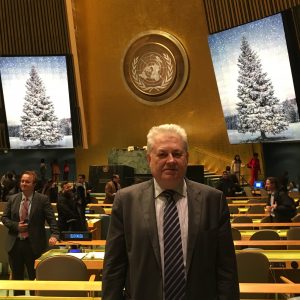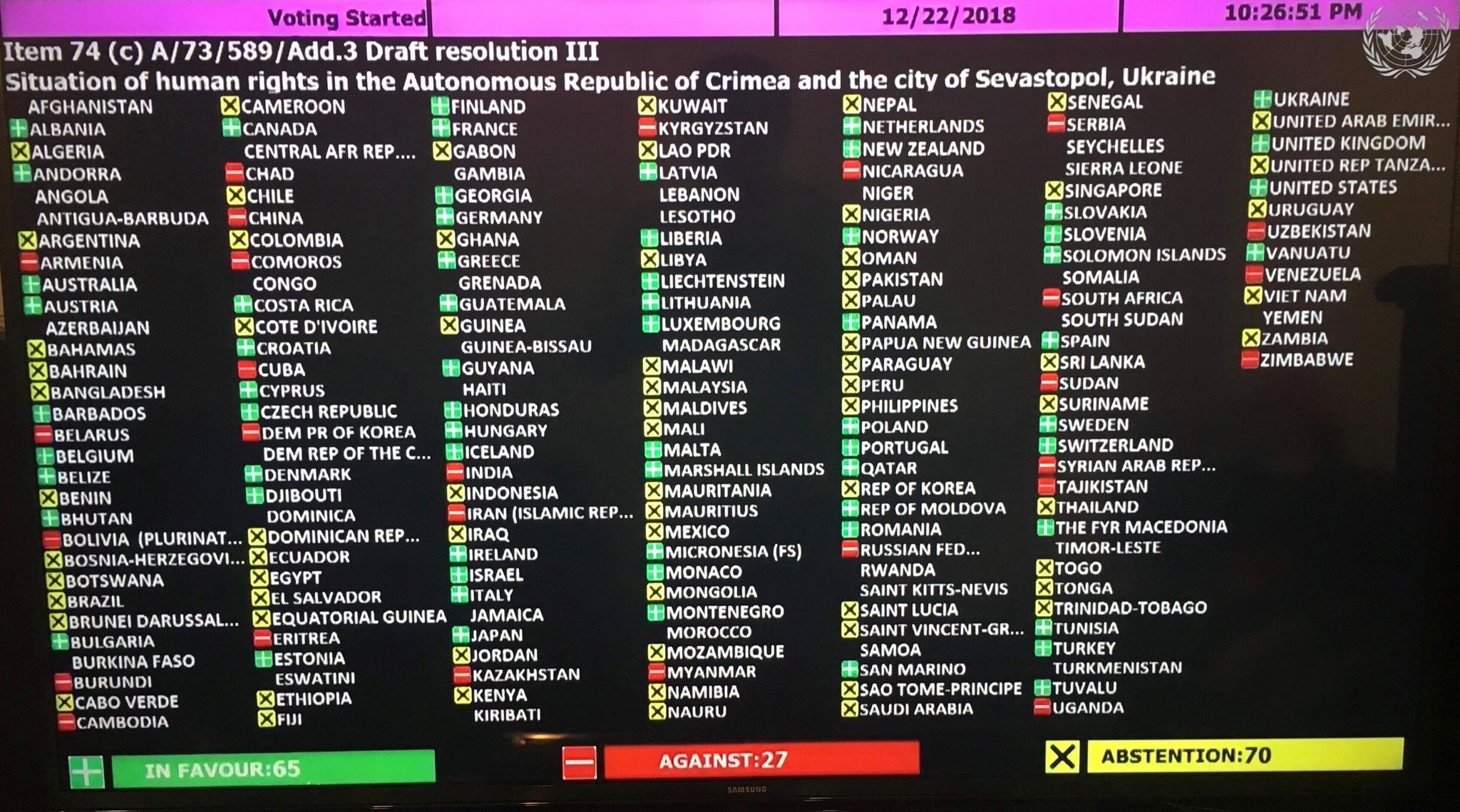On 22 December, the United Nations General Assembly adopted the resolution A73/L.48 titled “Situation of human rights in the Autonomous Republic of Crimea and the city of Sevastopol, Ukraine.”
Volodymyr Yelchenko, Permanent Representative of Ukraine to the United Nations, wrote quite a positive assessment of the results of 73rd session of General Assembly on his twitter:
“Too early to sum up but still:
1. Exceptionally strict resolution against the militarization of Crimea and Azov. Never before did the UN so much disgrace a permanent member of the Security Council.
2. The strongest resolution on violations of human rights in the Crimea.
3. The new agenda item, which will hold the aggressor severely.
Not bad at all.”

There are already four United Nations resolutions on occupied Crimea. The first one (68/262) was adopted in March 2014: the UN confirmed the territorial integrity of Ukraine, stressing that the so-called “referendum” of March 16, which led to the occupation of the Crimean peninsula, “has no legal force.”
The next resolution (71/205), approved on 19 December 2016, recognized Russia as an occupying power
, and among other things called to end Russian repressions against Crimean Tatars, release illegally imprisoned Ukrainians, reverse the ban of the Mejlis, the Crimean Tatar representative organ, and to stop using the Russian justice system on the peninsula. 70 countries voted in support of this document, 26 voted against, and 77 abstained.
The one adopted in 2017, 72/190, was similar to the previous one but took the human rights agenda a step further, invoking international humanitarian law, i.e. recognizing not only the ongoing occupation but an international armed conflict. Here 70 countries voted in favor, 26 voted against, and 76 abstained.
Finally, a week ago, on 17 December, the UNGA adopted the resolution A/73/L.47 on the militarization of Crimea by 66 votes with 19 countries voted against and 72 abstained. This resolution for the first time referred to the Budapest memorandum and condemned not only the annexation per se but also the recent concentration of Russian armed forces in Crimea.
Yet, the last resolution on “Situation of human rights...” besides recalling previous resolutions, also adds several new points and widens the international reaction against the Russian occupation.
Main points of the resolution
The resolution recognizes that according to the reports of United Nations High Commissioner for Human Rights and other institutions, the overall human rights situation sharply deteriorated in Crimea since the last year. Among the long list of different violations of human rights, which are mentioned in the resolution, there are:
- the imposition of automatic Russian citizenship on protected persons in Crimea, which is contrary to international humanitarian law;
- involuntary placement in a psychiatric institution as a form of harassment against and punishment of political opponents and activists (this is actually a well-known Soviet practice already);
- since 2014, torture has reportedly been used by the Russian authorities to extract false confessions for politically motivated prosecutions, including in the case of Oleg Sentsov, a Ukrainian film-maker, and expressing deep concern about the ongoing arbitrary detentions and arrests by the Russian Federation of Ukrainian citizens, including Volodymyr Balukh and Emir-Usein Kuku;
- the ongoing pressure exerted upon religious minority communities;
- the decision of the so-called Supreme Court of Crimea of 26 April 2016 and the decision of the Supreme Court of the Russian Federation of 29 September 2016 to declare the Mejlis of the Crimean Tatar People, the self-governing body of the Crimean Tatars, to be an extremist organization and to ban its activities;
etc.
The resolution urges
- To immediately release and allow the return to Ukraine, without preconditions, of Ukrainian citizens who were unlawfully detained and judged without regard for the requirements of international law
- To monitor and accommodate the medical needs of all Ukrainian citizens unlawfully detained
- To create and maintain a safe and enabling environment for journalists and media workers, human rights defenders and defense lawyers to perform their work
- To ensure the availability of education in the Ukrainian and Crimean Tatar languages;
- To end the practices of deporting Ukrainian citizens from Crimea for not taking Russian citizenship
etc.
Three exceptional points in the resolution are important to highlight separately
1. For the first time, the text of the resolution on the human rights situation in the Crimea referred to the rules of Nelson Mandela, which describe the Minimal standard UN rules for treatment of prisoners. The monitoring of the Crimean human rights group shows that the Russian Federation is constantly violating these rules during the occupation of the peninsula. Crimean Human Rights Group has documented numerous acts of torture, inhumane treatment and torture conditions in the Crimean prisons. In particular, torture is documented in the case of Oleg Sentsov, in the case of "Crimean saboteurs," and many others. Medical care for prisoners is not provided on time, and sometimes it is not allowed at all.
2. The Resolution mentions the names of three political prisoners of the Kremlin: Oleg Sentsov, Volodymyr Balukh, and Emir-Usein Kuku
, who had declared hunger strikes in protest of Russian arbitrariness. It’s exceptionally important according to the words of Serhiy Kyslytsia, Deputy Minister of Foreign Affairs. According to the diplomat, the names of Sentsov, Baluk, and Kuku in the resolution are a “security certificate of sorts” for them and dozens of other illegally imprisoned Ukrainians.
“Personally, I recall only two incidents in the history of the United Nations when the General Assembly’s resolutions condemned the persecution of specific individuals – the leader of the struggle against apartheid Nelson Mandela and the opposition leader of the Moon, Aung San Suu Kyi. The names of these people entered world history, and the whole world demanded their release,” wrote Kyslytsia.
3. Finally, the resolution calls upon all international organizations and specialized agencies of the United Nations system, when referring to Crimea in their official documents, communications and publications, including with regard to statistical data of the Russian Federation, to refer to “the Autonomous Republic of Crimea and the city of Sevastopol, Ukraine, temporarily occupied by the Russian Federation”, and encourages all States and other international organizations to do the same;
“That’s why the next time that school textbooks or atlases of ‘country X’ mark Crimea as “not Ukrainian,” you can rightfully cite the provisions of the resolution.” Kyslytsia stressed.
The resolution was adopted by 65 countries with 27 voting against and 70 abstentions. Generally, the countries supporting the resolution and those rejecting it are the same as those who voted for and against the resolution A/73/L.47 on the militarization of Crimea which was adopted on 17 December. However, 8 more countries voted against this time. Uganda, China, India, South Africa, Kyrgyzstan, Kazakhstan, and some others were in the list of opponents of resolution. These are mainly those countries who themselves don’t assure human rights well or those closely affiliated with Russia.
“That's all that Russian diplomacy was able to do. Stay together with Syria and North Korea, a cool company!” the Permanent Representative of Ukraine also wrote, retweeting the official account of the Russian mission to UN:
#Kuzmin: The draft resolution of the GA 3d Committee on #Crimea is an anti-Russian document which contains false facts and allegations. Moreover, it is absolutely meaningless. pic.twitter.com/Argvz7DbOq
— Russia at the United Nations (@RussiaUN) December 23, 2018



